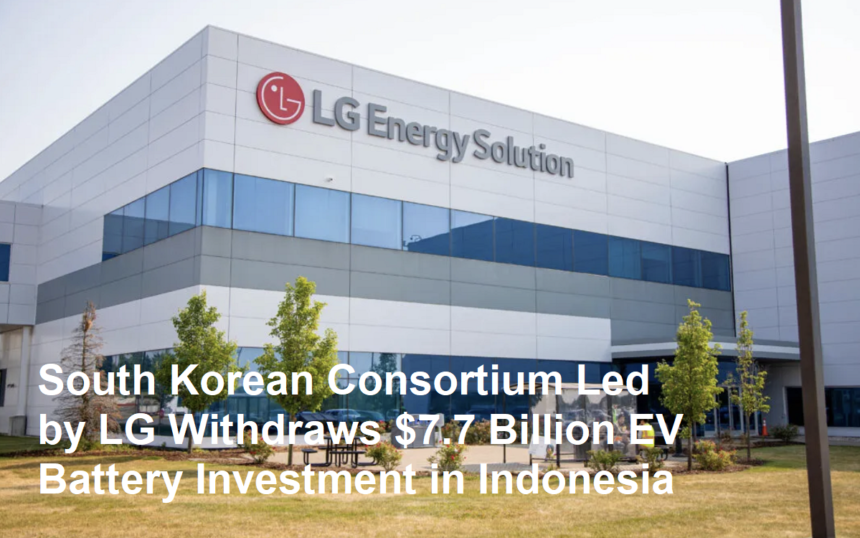A South Korean investor consortium, spearheaded by LG Energy Solution, has decided to withdraw a monumental $7.7 billion investment earmarked for developing an electric vehicle (EV) battery supply chain project in Indonesia. The move deals a significant blow to Indonesia’s ambitions to become a global hub for EV battery production, raising questions about regulatory challenges and shifting global market dynamics.
Details of the Investment Project:
The project, initially announced in 2022, aimed to establish an integrated EV battery supply chain leveraging Indonesia’s vast nickel reserves—a critical component for lithium-ion batteries. The consortium, which included LG Chem, POSCO Holdings, and other Korean firms, planned to construct smelting facilities, battery precursor plants, and recycling units across Central Sulawesi and North Maluku. The investment was part of Indonesia’s broader strategy to capitalize on its nickel resources, which account for nearly 22% of global reserves, to attract downstream industries and add value to its raw materials.
Reasons for Withdrawal:
While official statements cite “strategic realignment” as the primary reason, industry analysts speculate that regulatory uncertainties and environmental concerns played pivotal roles. Indonesia’s recent ban on raw nickel exports, intended to promote domestic processing, has led to complex licensing processes and disputes with international investors. Additionally, stricter environmental, social, and governance (ESG) standards globally may have pressured the consortium to reconsider projects in regions criticized for mining practices. Economic factors, such as rising operational costs and fluctuating nickel prices, further compounded challenges.
Reactions from Stakeholders:
In a press release, LG Energy Solution stated, “This decision aligns with our revised global strategy to optimize resource allocation amid evolving market conditions.” Indonesian officials responded with disappointment but emphasized resilience. Septian Hario Seto, Deputy Minister for Mining, remarked, “While we regret this decision, Indonesia remains committed to fostering a transparent and sustainable investment ecosystem. Our nickel resources and partnerships with other global players will continue to drive our EV ambitions.”
Impact on Indonesia’s EV Ambitions:
The withdrawal delays Indonesia’s timeline to establish a full-scale EV battery ecosystem, crucial for its goal to control 10% of the global lithium battery market by 2030. The project’s collapse could deter short-term investor confidence, though Indonesia’s nickel reserves remain a long-term lure. The government had previously secured deals with Hyundai and Tesla, which are proceeding, albeit cautiously.
Broader Global Context:
The EV battery market is highly competitive, with China dominating 70% of production. South Korea, home to LG and Samsung SDI, seeks to expand its footprint but faces pressure to adhere to ESG standards. Indonesia’s nickel-driven strategy, while unique, must balance environmental safeguards with investor incentives. Meanwhile, the EU’s Carbon Border Adjustment Mechanism (CBAM) and U.S. Inflation Reduction Act incentivize localized, sustainable supply chains, redirecting investments away from regions with weaker regulations.
Future Outlook:
Indonesia may need to streamline regulations and enhance infrastructure to retain investor interest. Prabowo Subianto’s incoming administration, set to take office in October 2024, faces pressure to address bureaucratic hurdles. Meanwhile, LG’s pivot could signal a shift toward markets with stable policies, such as the U.S. or Europe, where it is investing in joint ventures with automakers like GM and Honda.
This withdrawal underscores the fragile interplay between resource-rich nations and global capital. For Indonesia, recalibrating its approach to balance economic growth with sustainability will be key. As the EV revolution accelerates, the nation’s ability to adapt will determine its position in the race to power the future of mobility. As analyst Muhammad Faisal of Citigroup notes, “Indonesia’s potential is undeniable, but translating resources into reliable supply chains requires more than just minerals—it demands trust, transparency, and time.”












